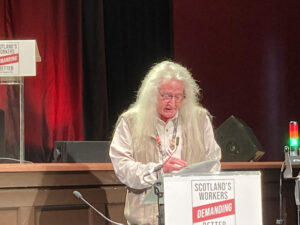Congress recognised the importance of flexible working, especially for the recruitment and retention of women workers, and the STUC pledged to continue its campaign to make alternative working patterns the norm.
UNISON’s Jim Boyes, told delegates that flexible working is a vital part of resolving the recruitment and retention crisis – not just in nursing and midwifery but also for health care support workers, allied health professional assistants and nursing assistants.
 Jim said: “More flexible working is one of a range of constructive proposals we made earlier this year to Ministers and MSPs for resolving the current crisis.
Jim said: “More flexible working is one of a range of constructive proposals we made earlier this year to Ministers and MSPs for resolving the current crisis.
“It’s all very well knowing the causes of the problems. We need to spell out the solutions,” warned Jim, pointing out that one of these solutions is that if you have a majority female workforce you need to provide working patterns that fit with their care roles outside of work.
“It’s vital we offer staff working patterns and options that allow them to continue their careers and remain in permanent NHS posts.
“To reduce spending on agency staff, and retain and develop a skilled workforce, then flexible working must be a priority.”
Later, Congress slammed the lack of progress on a shorter working week despite a scoping project by the Scottish Government which showed overwhelming support amongst workers.
The General Council will demand action by the Scottish Government towards a 35 hour week and a clear policy objective and timetable for a four day week.
 Supporting the motion, UNISON’s Tony Caleary spoke of the benefits to society of a shorter working week, pointing out that it would see a much reduced carbon footprint due to a reduction in travel.
Supporting the motion, UNISON’s Tony Caleary spoke of the benefits to society of a shorter working week, pointing out that it would see a much reduced carbon footprint due to a reduction in travel.
He added that it would reduce unemployment, could increase productivity and see a reduction in sickness and absenteeism and could have a substantial positive impact on both recruitment and retention of staff.
“It would also lead to improved wellbeing, both mentally and physically by reducing stress levels and allowing more opportunities for exercise and interaction with families and friends,” he said.
“Finally, a shorter working week would mean that we’d all have more time to participate in local activities, to find out what’s going on around us, to engage in politics, locally and nationally, to ask questions and to campaign for change.”
